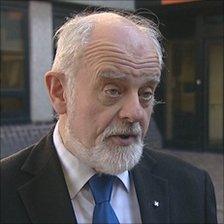Conservative council boss says transparency 'will cost'
- Published

Councillor Keith Mitchell fears an extra two council staff will be required
The leader of Conservative-run Oxfordshire County Council has criticised government plans for all councils to publish their expenditures.
Councillor Keith Mitchell said he feared an extra two council staff would be needed to answer queries on 4,000 listings a month in the county.
The council needs to save up to £203m by 2015 after government spending cuts.
The government has asked all councils to increase public spending transparency from 2011.
Local government minister Baroness Hanham said: "One hundred councils have already made the simple switch to putting spending data online.
"Rather than creating a new financial burden, greater transparency and accountability will help reduce wasteful expenditure."
But Mr Mitchell said the county council already employed two staff to answer Freedom of Information Act queries.
"This listing will have over 4,000 items every month for our council, because we spend £1m a year," he said.
Extra savings
"We employ two people, full-time, answering Freedom of Information requests, and I'm rather fearful we're going to have to take on two more staff to answer all the questions that will come in about why we're paying, you know, £723 to a very strange name.
"People won't understand from seeing who it's paid to, what the amount is. We'll get lots inquiries and we're going to have to staff to answer them."
Earlier this month, Mr Mitchell warned the county's "valued services", including care services, were likely to be "deeply affected" in the cuts and that facilities in communities would close.
He said the county council's finance experts had estimated the greatest proportion - about 50% - of the savings required would need to be made in the 2011-12 financial year.
However, he said the council was already on course to save £35m this year from staff cuts, a pay freeze, management restructuring and cutting costs.
In October, Chancellor George Osborne said in the government's Spending Review that local authority funding would be cut by 28.4% by 2015.
- Published9 November 2010
- Published21 October 2010
- Published20 October 2010
- Published20 October 2010